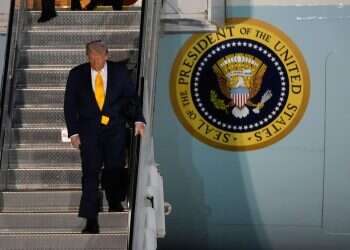Sunday night's wild rocket attack on the western Negev and Gaza envelope communities forced Israel into an uncomfortable corner at an inconvenient time. Contrary to its stated desire to maintain calm in the south, Israel had to act, but still with the clear intention of keeping the ceasefire with Hamas intact and avoiding a wide-scale escalation on the eve of the March 2 general election.
This time, too, Palestinian Islamic Jihad was behind the mayhem, similar to its previous efforts over the past year and a half (and on the eve of the last election in September) to torpedo any attempt by the sides to reach an agreement. It doesn't matter whether these efforts stem from an internal rivalry with Hamas, PIJ's natural anarchism, or directives from its Iranian master, the result is the same: Palestinian Islamic Jihad is currently the primary source of Gaza's ills.
Follow Israel Hayom on Facebook and Twitter
Those who thought that the assassination of Baha Abu Al-Ata in November would mute the organization were proven wrong in recent days. His successors have shown they are equally brash and petulant. Despite Egypt's overt efforts to mediate a ceasefire, the organization's belligerence hasn't waned. Last week, a terrorist cell was wiped out on the southern Gaza border, and early Sunday morning a second cell was eliminated when its members tried planting powerful explosives on the border fence.
The rocket fire on Sunday was the response to these incidents. Officially, PIJ says it retaliated for the "humiliation" of the IDF using a bulldozer to retrieve the body of one of these killed terrorists. Contrary to this claim, this is not a new Israeli policy: For decades now, the IDF has taken the bodies of terrorists from the battlefield to be used in future prisoner exchange negotiations. The difference on Sunday was that the fight between IDF forces and Palestinians, who tried preventing the army from taking the corpse, was caught on film and broadcast. The images stoked the flames and provided ample pretext for PIJ's attempt at revenge.
It wasn't clear on Sunday whether Hamas opposed the rocket fire at Israel or willfully turned a blind eye to it. After al-Ata's assassination, Hamas allowed PIJ to retaliate and shoot, but it stayed out of the fray. On Sunday, too, Hamas wasn't involved in the shooting, and its conduct in the coming hours and days will greatly determine which direction the situation is heading. If it stays out of the fight, it's reasonable to assume the hostilities will quickly fizzle.
This also depends, to a great degree, on the nature of the Israeli response. No one in Israel has the appetite for a large-scale military operation, whose outcome is uncertain, on the eve of an election. But on the other hand, Israel has to respond in some capacity to the rocket barrage. Not just because of the election, but first and foremost for the sake of deterrence, which the IDF has struggled to maintain over time against Palestinian Islamic Jihad.
Moving forward, the question on Sunday wasn't whether to respond, but how, and mostly how hard. Expectedly, the IDF's main target was PIJ, but the dilemma remains over whether to include or exclude Hamas as a target, as the entity responsible for Gaza, so as to avoid an all-out conflagration we don't want. Because the primary Israeli interest was and still is securing peace and quiet in Gaza and avoiding a dire escalation, we can expect an effort (overt and covert) to try ending the event as quickly as possible.
It's safe to assume Hamas has a similar interest, because of its stated desire for a ceasefire. The organization in recent days received an array of benefits – the expansion of the fishing zone off the Gaza coast and an increase of the number of permits for Gazans to work in Israel. Later this week Hamas is also slated to receive another cash shipment from Qatar (which, as reported, Israel played a key role in arranging). An escalation at this juncture means revoking all these benefits, which would exacerbate the economic situation in Gaza, which is the exact opposite of what Hamas says it wants.
The Egyptians, as usual, will be called upon to help calm the situation, along with the UN's mission to Gaza. They've likely already engaged with the sides, but will only be able to make progress after the current tit-for-tat subsides. Even then, as we've learned time and again in recent weeks, any understandings that are reached must be taken with a sizeable grain of salt. Gaza is extremely easy on the trigger, and – as evidenced Monday afternoon – it won't hesitate to pull it again.




